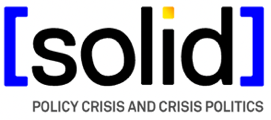
The main objective of this project is to track the evolution of solidarity in Europe (SiE), understood as the sharing of risks and resources amongst Europeans. The project fields a yearly, nationally-representative, large-N survey since 2018, with the aim of monitoring the extent to which support for solidarity has changed over time, particularly in light of the emergence of collective, pan-European crises such as COVID-19 or the geopolitical crisis in Ukraine. The project is a collaboration between the EUI and YouGov, hosted under the EGPP’s remit and, from 2022, in partnership with the ERC project SOLID who conjointly develop the survey and provide input and resources. The project produces research outputs such as datasets, scientific journal articles, policy briefs and media contributions, and will replicate and expand the survey annually in the upcoming years.
All six waves of the survey (2018-2023) are publicly available on GESIS and Cadmus (see links below) and are fielded every year between late March and late April; each wave’s sample size is around 20.000 respondents, while the country pool has been gradually expanded since the first rendition of the survey (2018), reaching 16 EU member states and the UK in the 2023 SiE survey wave.
Since the beginning of the project, the survey explores how support for European solidarity varies by issue (solidarity for what?), instrument (solidarity how?) and by member state (solidarity by whom for whom?). The 2020 survey extended the scope of the research to inquire which ‘kind of society’ and which ‘kind of Europe’ citizens wish to live in. The 2021 survey included additional questions on COVID-19 vaccines and restrictions; the 2022 wave further expanded the questionnaire with questions on the war in Ukraine; and, finally, the 2023 wave incorporates new items designed to further probe solidarity preferences under different crisis contexts and along different types of policy instruments.
To promote research on European solidarity, the project hosts a yearly call for contributions, culminating in the SiE-SOLID conference in Florence, held in partnership with the EGPP and SOLID. The conference, one of the key events on European solidarity around the year, fosters the production and sharing of the most recent scholarship on solidarity in Europe and the EU. Moreover, the conference is also an important forum for scholars to participate in finetuning future survey waves, adjusting them to new challenges, crises and opportunities that arise over time. While past conferences were held in late January, the 2025 edition is set to take place in May.
The project is currently led by Dietlind Stolle (McGill and EUI), Luis Russo (EUI) and Lorenzo Cicchi (EUI), with the collaboration of Hanspeter Kriesi (EUI), Ioana-Elena Oana (EUI), Alexandru Moise (EUI) and Daniel Kovarek (EUI). Other members of SOLID provide input and collaboration during fieldwork, which is ensured by YouGov under the direction of Stephan Shakespeare and Jonathan van Parys. Previous members include the two project founders (Philipp Genschel, Bremen and EUI) Anton Hemerijck (EUI) and Mohamed Nasr (ETH Zürich).
Research based on SiE data is welcome; for any inquiry concerning the survey or the SiE conference, please contact egpp@eui.eu.
Dataset (Cadmus)
Datasets (Gesis)
- 2018 SiE survey data
- 2019 SiE survey data
- 2020 SiE survey data
- 2021 SiE survey data
- 2022 SiE survey data
- 2023 SiE survey data
- 2018 to 2023 SiE trendfile
Peer-reviewed articles
- Clasen, P. (2024): ‘Solidarity on a divided continent: Perceptions of ‘centre’ and ‘periphery’ determine European citizens’ willingness to help other EU countries’. European Union Politics, 0(0). https://doi.org/10.1177/14651165241251833
- Kriesi, H., Moise, A. D., & Oana, I. E. (2024). ‘The determinants of transnational solidarity in the EU. West European Politics’, 1–27. https://doi.org/10.1080/01402382.2024.2340336
- Stolle, D. (2023): ‘Aiding Ukraine in the Russian war: unity or new dividing line among Europeans?’ European Political Science. https://doi-org.eui.idm.oclc.org/10.1057/s41304-023-00444-7.
- Hemerijck, A. (2023): ‘Towards a European Union of Social Investment Welfare States, Intereconomics’, Vol. 58, Issue 5, https://doi.org/10.2478/ie-2023-0049
- Winzen, T.; Schimmelfennig, F. (2023): ‘National Differentiation Experience and Citizen Support for Differentiated Integration’, JCMS: Journal of Common Market Studies, , Vol. 61, Iss. 5, pp. 1235-1260, https://doi.org/10.1111/jcms.13460
- Genschel, P., Leek, L., & Weyns, J. (2023): ‘War and integration. The Russian attack on Ukraine and the institutional development of the EU’. Journal of European Integration, 45(3), 343–360. https://doi-org.eui.idm.oclc.org/10.1080/07036337.2023.2183397
- Afonso, A., & Negash, S. (2023): ‘Selective European Solidarity: How Recipient Country Characteristics Shape Support for International Redistribution in Europe’. Journal of Common Market Studies 61, 871–888 (2023). https://doi-org.eui.idm.oclc.org/10.1111/jcms.13506
- Russo, L. (2023): ‘A supranational solidaristic space? Comparative appraisal of determinants of individual support for European solidarity in the COVID-19 era’. Comparative European Politics 21, 554–574 (2023). https://doi-org.eui.idm.oclc.org/10.1057/s41295-023-00345-5
- Genschel, P. (2022): ‘Bellicist integration? The war in Ukraine, the European Union and core state powers’, Journal of European Public Policy, DOI: 10.1080/13501763.2022.2141823
- Telle, Stefan; de Blok, Lisanne; de Vries, Catherine E; Cicchi, Lorenzo (2022): Elite-Mass Linkages in the Preference Formation on Differentiated Integration, Journal of Common Market Studies, volume 60, issue 6, pp. 1663 – 1683
- Bauhr, M. & Charron, N. (2022): ‘All hands on deck’ or separate lifeboats? Public support for European economic solidarity during the Covid-19 pandemic’, Journal of European Public Policy, DOI: 10.1080/13501763.2022.2077809
- de Blok, L., & de Vries, C. E. (2022). A blessing and a curse? Examining public preferences for differentiated integration. European Union Politics, 0(0). https://doi.org/10.1177/14651165221133671
- Nasr, M. (2022). Varieties of Ambiguity: How do Voters Evaluate Ambiguous Policy Statements?, Comparative Political Studies, 0(0). https://doi.org/10.1177/00104140221089652
- Bremer, B. and Genschel, P. and Jachtenfuchs, M. (2020): ‘Juncker’s Curse? Identity, Interest, and Public Support for the Integration of Core State Powers’, JCMS: Journal of Common Market Studies, Vol. 58, Issue 1, pp. 56-75, 2020, Available at SSRN: http://dx.doi.org/10.1111/jcms.12980
- Baute, S., Meuleman, B., Abts, K. et al. (2018): Measuring Attitudes Towards Social Europe: A Multidimensional Approach. Social Indicators Research 137, 353–378 https://doi.org/10.1007/s11205-017-1587-3
Conference Addresses
- 2024 SiE Conference, Day 1
- 2024 SiE Conference, Day 2
- 2023 EGPP Annual Conference, ‘Unity or new cleavage: the public support for aiding Ukraine in the invasion by Russia’ (Stolle)
- 2023 SiE Conference, ‘Introducing the EUI-YouGov dataset’ (Russo)
- 2023 SiE Conference, ‘European solidarity and the war in Ukraine’ (Stolle)
Policy briefs
- 2022 Egmont and Konrad-Adenauer-Stiftung report ‘Perspectives on the future of Europe from the centre of European societies’ (Francesca Colli, Johannes Greubel, Dr. Holger Thiel)
- 2022 Integrating Diversity in the European Union (InDivEU) deliverable, ‘Citizens support the differentiated integration of their country’, RSCAS Policy Briefs, 2022/29 (Frank Schimmelfennig,) http://hdl.handle.net/1814/74518
- 2021 Policy brief ‘Solidarity and Trust in Times of Covid-19’ (Genschel, Hemerijck, Nasr and Russo)
- 2020 Policy brief ‘EU Solidarity in times of Covid-19’ (Cicchi, Genschel, Hemerijck and Nasr)
- 2018 Policy brief ‘Solidarity in Europe’ (Genschel and Hemerijck), prepared for the 2018 State of the Union conference
- 2018 ‘The European Social Union: how to piece it together’ in ETUI report ‘Social policy in the European Union: state of play 2018’ (Maurizio Ferreira, Eds. Bart Vanhercke, Dalila Ghailani and Sebastiano Sabato)
Press and blogs
- 2021 report ‘Solidarity across borders – solidarity beyond borders?’ in Charlemagne Prize Academy Annual Report 2021 on the Future of the Union: Europe at the Crossroads – New Perceptions of Solidarity , Charlemagne Prize Academy (Hannah Pool)
- 2022 EUIdeas blog entry, ‘The EU Treaty reform challenge: Is there a winning package?’ (Catherine De Vries, Simon Hix and Miriam Sorace)
- 2022 Social Europe article ‘European solidarity: silver linings through dark clouds’ (Genschel, Hemerijck and Russo)
- 2022 YouGov article ‘Support for Ukraine is strong in Europe, but nations are not as united as it looks’ (Stolle)
- 2020 EUIdeas blog entry ‘Corona Solidarity’ (Björn Bremer and Philipp Genschel)
- 2020 Blog post ‘Corona Solidarity’ (Bremer and Genschel)
- 2020 Die Zeit article (in German) based on EUI-YouGov data ‘Die Europäische Versicherungsunion’
- 2020 YouGov UK report ‘What the EU should be’ (Smith)
- 2020 YouGov Italy report (in Italian) ‘Cosa dovrebbe essere l’Unione Europea?’
- 2020 The Independent article based on EUI-YouGov data ‘Another hidden cost of Brexit has been laid bare – people will be less willing to help the UK in a crisis’
State of the Union addresses
- 2024 Recording of the State of the Union presentation ‘European Solidarity in Times of Crisis’ (Stolle, EUI team, Gareau-Paquette, Hicks, Bergeron-Boutin & Noveck)
- 2023 Recording of the State of the Union presentation ‘Learning from Adversity: Towards a European Union of Social Investment Welfare States’ (Hemerijck)
- 2023 Recording of the State of the Union presentation ‘One Year On: State of European Solidarity in 2023’ (Russo)
- 2022 Recording of the State of the Union presentation ‘Social Justice in Post-Pandemic Europe’ (Stolle, Hemerijck)
- 2021 Recording of the State of the Union presentation ‘How did the COVID-19 pandemic change citizens’ attitudes towards the EU, towards national governments and towards each other?’ (Genschel, Hemerijck and Nasr)
Preprints and conference papers
- 2023 RSC Working Paper 2023/48, ‘Shared Identity in Crisis: A Comparative Study of Support for the EU in the Face of the Russian Threat’ (Schulte-Cloos, J., Dražanová, L.)
- 2022 preprint ‘Does differentiation beget differentiation?: Examining the link between implementation of and support for differentiation’, (Martin Moland)
- 2022 conference paper, ‘A Centre-periphery divide in EU politics and its structuring effect on citizens’ willingness to show solidarity with other countries’, ECPR General Conference 2022 (Patrick Clasen)
- 2021 preprint ‘Statistical Analysis of Institutional Trust and Vaccine Hesitancy in Europe’, (R Donovan)
- 2021 preprint ‘Determinants of Selective Solidarity Across Borders’ (Alexandre Afonso, Samir Negash). https://doi.org/10.31235/osf.io/a75wx


